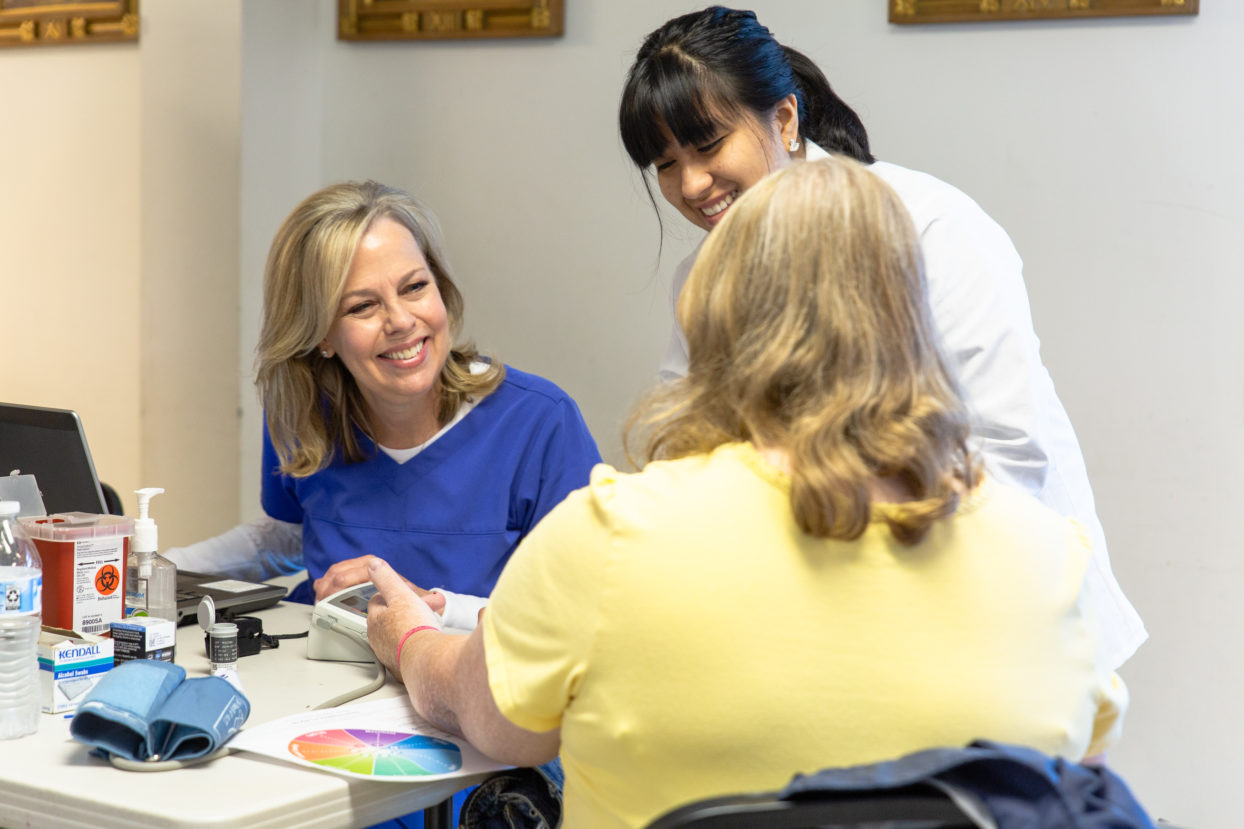Mobile clinic has ‘arrived’ as it marks fifth anniversary delivering free medical care in East Tennessee
Story by Bill Brewer
Photography by Stephanie Richer
The Diocese of Knoxville ended 2018 mourning the loss of East Tennessee’s first Catholic hospital, the former St. Mary’s, that closed Dec. 28. But the healing hands of Jesus are still at work through the Sisters of Mercy and the St. Mary’s Legacy Clinic, which begins 2019 by marking its fifth anniversary.
Bishop Richard F. Stika, who conceived the idea for the legacy clinic after St. Mary’s Hospital was acquired by a for-profit company in 2011, is celebrating the mobile clinic’s anniversary as a testament to the Catholic Church’s mission of being the face, hands, feet, and heart of Jesus, as well as the healing legacy of the Sisters of Mercy.
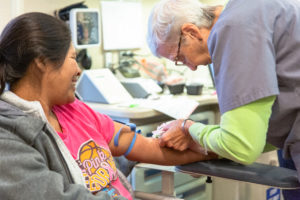
St. Mary’s Legacy Clinic volunteer nurse Star Lakavage, LPN, treats a patient at the Rutledge clinic.
Bishop Stika looks with a certain sense of pride at what the mobile clinic has become and is appreciative of what the clinic staff and volunteers have accomplished in carrying out the Church’s mission.
“I think it’s been very successful,” the bishop said, reflecting on the past five years. He expressed sadness that the former St. Mary’s Hospital has closed, pointing out that health care across the country is going through major changes.
Bishop Stika shared that when the St. Mary’s Legacy Clinic was blessed in September 2013, Cardinal Timothy M. Dolan of the Archdiocese of New York and Archbishop Robert J. Carlson of the Archdiocese of St. Louis were present and had a first-hand glimpse of the clinic just before it went into service.
He said the Archdiocese of St. Louis just initiated a clinic and New York is in the process of putting one into service.
“I’m proud of the fact that both of them have added clinics to their dioceses. Both the archbishop and cardinal said it was because of the idea they received in Knoxville,” Bishop Stika said. “It’s the legacy of St. Mary’s Hospital, which unfortunately the old facility has closed. But the work of St. Mary’s continues on.”
Bishop Stika said his vision for the next five to 10 years for the clinic is that “it continues on and that the clinic’s work continues to impact the people who are among the most needy in East Tennessee.”
Bishop Stika named Sister Mariana Koonce, RSM, the Legacy Clinic’s medical director, and in September
2013 they unveiled the new mobile clinic, which went into service in January 2014.
Since the first clinic visit, which took place in Cumberland County, the clinic van has logged some 35,000 miles, traveling on average about 700 miles per month to rural clinic sites.
Sister Mariana measures success in small, humble steps when she describes how the St. Mary’s Legacy Clinic has persevered in bringing free health care to hundreds of East Tennessee’s neediest residents.
The Religious Sister of Mercy of Alma, Mich., and physician acknowledges the road to acceptance by people in desperate need of consistent, reliable medical care at no cost to them hasn’t always been smooth.
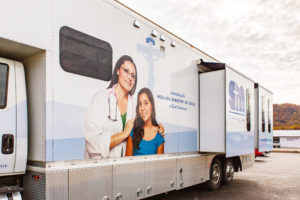 While some rural East Tennessee communities, such as Crab Orchard in Cumberland County, embraced the mobile clinic’s mission, others like Washburn in Grainger County, weren’t immediately receptive.
While some rural East Tennessee communities, such as Crab Orchard in Cumberland County, embraced the mobile clinic’s mission, others like Washburn in Grainger County, weren’t immediately receptive.
Those communities are among six the mobile clinic has been serving across the Diocese of Knoxville since it began operating.
Sister Mariana can pinpoint a moment she realized the clinic had achieved acceptance by East Tennessee’s mountain residents.
“My favorite story from Washburn is from the beginning we set up our travel calendar based on the day of the month. Washburn is the first Wednesday of the month. Crab Orchard is the second and fourth Tuesday of the month, etc.,” she said, noting that clinic staff remind patients they only need to remember the clinic is in their community the same days each month; they don’t have to keep up with specific dates.
“One day, a patient walked in and wasn’t on the schedule, although she had visited the clinic before. She said, ‘It is the first Wednesday. I knew you were going to be here.’ I then thought yes, we’ve arrived. This is what I was hoping for.”
For Sister Mariana, Washburn is a microcosm of the region the clinic serves.
“I knew in Washburn we had to persevere because I had been told in advance about the community culture there; there was a tendency for social action groups to go in there to do some good, and when they don’t get the results they are looking for they pull out. Washburn has become jaded from people not persevering. I knew we had to persevere,” she said, pointing out that Washburn was selected as one of two Grainger County clinic sites because it’s a remote area especially in need of the clinic’s services.
“I just thought it was important to start in Washburn first before Rutledge, so we did. It was the hardest site to break into. We knew it was a very needy area. It was the community culture there; they were a little more suspicious of outsiders perhaps, Catholics especially. I would call it our most classically Appalachian culture. It was a difficult beginning there. It was a tougher location to start in. We had many days when we were there and no patients came or there were one or two,” Sister Mariana said.
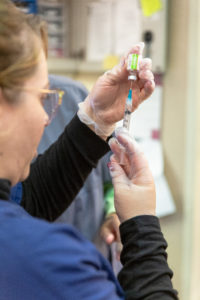 Perseverance pays off. The mobile clinic is established in Washburn now, with the monthly patient schedule nearly full. The clinic also is established in the other communities it serves: Decatur in Meigs County, Athens in McMinn County, Gatlinburg in Sevier County, and Rutledge, also in Grainger County.
Perseverance pays off. The mobile clinic is established in Washburn now, with the monthly patient schedule nearly full. The clinic also is established in the other communities it serves: Decatur in Meigs County, Athens in McMinn County, Gatlinburg in Sevier County, and Rutledge, also in Grainger County.
Sister Mariana believes perseverance … and providence … are intangibles the clinic relies on.
As the clinic brings much-needed medical care to areas unserved or underserved by traditional health-care providers, the former Navy medical officer said God’s hand has clearly been present every step of the way since day one.
“We didn’t know for sure if we were going to be overrun with patients or if no one would come because of who we are since we’re Catholic. We are not ashamed to present ourselves in that way. But we didn’t know if that would be a turnoff for people,” Sister Mariana said. “As it turns out, we have a very stable patient base of people who come back to us over and over again and see us as their primary-care provider. And we have some very loyal and committed volunteers, some of whom have been with us the entire five years, as well as new volunteers coming in. There is no question God has blessed the mission.”
She credits God and His providence for delivering volunteers to the clinic, without whom the clinic could not operate.
The volunteer team includes doctors, nurses, medical assistants, and other general volunteers who deliver care and keep the clinic van rolling. Sister Mariana, who updates Legacy Clinic statistics annually, reported that 100 volunteers assisted the clinic in 2017, contributing more than 7,200 volunteer hours. Through
October, 5,900 volunteer hours had been tallied in 2018. According to Sister Mariana, more than 25,000 volunteer hours have been recorded since January 2014.
She said the clinic has treated 658 patients who have made 2,463 clinic visits over the past five years.
The 243 patients who visited the six clinic sites over 77 days in 2017 were at or below the federal poverty level, which is $12,060 in annual income per individual or $24,600 for a family of four. Roughly half of the patients seen were unemployed, and many of them are repeat patients.
According to the clinic’s 2017 stats, 77 percent of the patients were female and 23 percent were male, and 94 percent of the patients were between the ages of 19 and 64. In the last two statistical reviews, between 40 and 45 percent of the patients reported they had no other source of medical care.
The clinic has seen a steady increase in patients during the five-year period: 154 in 2014, 189 in 2015, 194 in 2016, and 243 in 2017. The number of days the clinic was in operation has followed suit: 42 in 2014, 53 in 2015, 61 in 2016, and 77 in 2017.
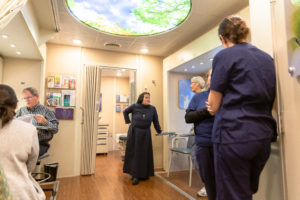 Sister Mariana puts the value of care provided by the St. Mary’s Legacy Clinic at $276,000 from 2014 to 2016 and $233,154 in 2017 alone. The care included $182,000 in physician/health-care provider visits from 2014 to 2016 and more than $104,000 in 2017 alone; $25,000 in laboratory services from 2014 to 2016 and $29,000 in 2017; $65,000 in pharmacy services from 2014 to 2016 and $100,000 in 2017. However, the cost of pharmacy services to the clinic was only $3,200 from 2014 to 2016 and $1,350 in 2017. There were nominal costs for vaccinations and electrocardiogram tests.
Sister Mariana puts the value of care provided by the St. Mary’s Legacy Clinic at $276,000 from 2014 to 2016 and $233,154 in 2017 alone. The care included $182,000 in physician/health-care provider visits from 2014 to 2016 and more than $104,000 in 2017 alone; $25,000 in laboratory services from 2014 to 2016 and $29,000 in 2017; $65,000 in pharmacy services from 2014 to 2016 and $100,000 in 2017. However, the cost of pharmacy services to the clinic was only $3,200 from 2014 to 2016 and $1,350 in 2017. There were nominal costs for vaccinations and electrocardiogram tests.
The Legacy Clinic’s annual budget is $250,000, of which about 50 percent of the funding comes from the Diocese of Knoxville through either direct support by the annual Bishop’s Appeal or through the St. Mary’s Legacy Foundation. The foundation is a nonprofit organization that supports charity, health care, and education through Catholic organizations serving those in need in East Tennessee. The foundation was formed in 2011 to continue providing support for the ministry begun by the Sisters of Mercy when St. Mary’s Hospital opened in 1930. Its establishment was made possible initially through funds provided by the sale of Mercy Health Partners and its St. Mary’s Medical Center to Health Management Associates. Tennova Healthcare acquired Health Management Associates in 2014.
The other half of St. Mary’s Legacy Clinic’s funding comes from individual and corporate donations and grants. The clinic’s primary costs are vehicle maintenance, laboratory tests, medical supplies, and administrative staff. The clinic has two full-time employees: Sister Mariana and clinical nurse manager Melissa Coldiron. Maria Zevallos is the part-time administrative assistant.
Everyone else who makes the clinic run week in and week out is a volunteer.
“We could not operate without our volunteers. While I don’t do much active (volunteer) recruitment personally, He (God) will send those who will do it,” said Sister Mariana, who credits Judy Schmidt for developing the volunteer team that makes the clinic work.
Ms. Schmidt, who died in January 2017, was the Legacy Clinic’s first volunteer and began the clinic’s volunteer recruitment process.
“She personally recruited a number of our volunteers. Over time, people have heard about the clinic and have wanted to join us. Some have stayed and some haven’t. This is one area where I completely rely on God’s providence to provide who we need. I mainly rely on volunteers to recruit other volunteers,” Sister Mariana said.
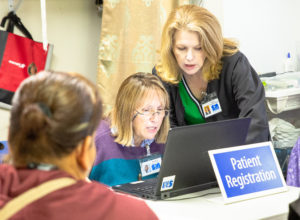
Clinic nurse manager Melissa Coldiron, RN, and general volunteer Brenda Boushell register patients at the Rutledge clinic.
“Our volunteers are amazing. They are so dedicated and so generous and so inspiring. I can’t even fathom it sometimes. These are not easy clinics, and these are not easy volunteer jobs.”
The clinic’s medical director described the daylong commitment at each site in which the volunteers must bear their own expenses. The clinic provides no reimbursements. “It’s BYOL – Bring Your Own Lunch, and it can be a full day of work for those traveling from Knoxville to a clinic site.”
She said volunteers also assist at the clinic’s administrative offices and vehicle storage facility in West Knoxville on the campus of the Church of Divine Mercy. “There are just two and a half paid staff members. We can’t do it all by ourselves. We must have volunteers. We couldn’t support seven clinics a month without volunteers,” she noted.
One of those volunteers is Ruth Pavelchik, who relishes the medical care provided by the clinic, as well as the evangelization opportunity it offers.
Ms. Pavelchik assists the clinic in Cumberland County at the Crab Orchard Care Center, which opened more than six years ago and has hosted the St. Mary’s Legacy Clinic for five years.
The Crab Orchard Care Center was providing free food to those in need when the community first learned of an opportunity to also provide free medical care. The Crab Orchard site was approved by the St. Mary’s Legacy Clinic in 2013 and began serving the community in January 2014.
“It is most heartwarming to be able to provide medical care to those most in need of it. Our patients do not have insurance and have medical conditions that have been untreated due to inability to pay for care. For our patients to be treated with dignity and respect, along with medical help, is our goal and is appreciated by them,” Ms. Pavelchik said. “Another benefit for us, as well as our patients, is that it gives us the opportunity to bring a Catholic presence to rural communities where that is unusual. Many people in rural communities have never had any contact with people of the Catholic faith. We are able to be the face of Jesus to our patients and have them get to know us as fellow Christians.”
Like all the clinic volunteers, Ms. Pavelchik considers her work in Crab Orchard as an extension of her Catholic faith.
“Our patients are so very grateful for their care. Our team of volunteers is very grateful for the opportunity to serve in this very special way. Bishop Richard Stika had the vision to begin this mission, and Dr. Mariana has been able to make this vision a reality. The rural communities in East Tennessee are so fortunate to have free medical care available where none was available,” Ms. Pavelchik said.
Joining the chorus of clinic supporters is Mary Nelson, director of the Crab Orchard Care Center.
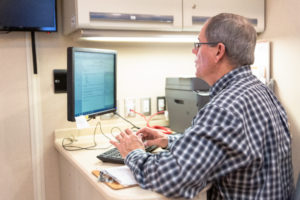
Bruce Fisher, Ph.D., who is a volunteer patient educator and mobile clinic driver, works on electronic patient records aboard the mobile clinic.
Ms. Nelson witnesses firsthand the impact the clinic has on her fellow Cumberland County residents. She believes healthier residents mean a healthier community.
“I think the clinic is wonderful. I wish it could come here more than two days a month, but I guess that is adequate for the health need here,” she said. “There are a lot of people with no insurance, and this opens the door to medical care for them. Otherwise, they might die of things that can be easily treated.”
Ms. Nelson also said residents in the community have told her they would not be able to see a physician if it were not for the mobile clinic. “There is a definite impact,” she added.
Sister Mariana shares that assessment, pointing out that many of the clinic’s patients have illnesses that keep them from working, but they are not on disability and are too poor to pay for standard health insurance.
She believes the clinic makes a difference in helping patients control their chronic diseases, in giving them a place to go when they have an urgent health need, and in providing access to medical specialists. Those chronic diseases include diabetes and hypertension.
“You could look at our numbers and say 658 patients in five years is hardly anything. In the big picture of how many patients are uninsured in East Tennessee, that’s a relatively small number. But for the patients we do see, we’re having an impact. Our Lord told us whatever you do for the least of my brothers and sisters you do for me. We take that seriously; we take that literally.
“Our patients are the least. They are so poor. Most of them are under 100 percent of the poverty level if they have any income at all. Our patients are truly the least. There is no question about that. We don’t have people making a lot of money coming to us just to get free health care. Our patients are on the margins, on the fringes of society, as Pope Francis has talked about. So they represent Christ to us. For every patient we see, that’s a way for us to touch Christ. That’s 658 Christs we’ve touched in the last five years,” she said.
One of those Christs touched by the clinic, Sister Mariana remembers, was a very reluctant Cumberland County patient. While this woman was showing signs of diabetes and had a family history of the disease, she was reticent to receive treatment, although she didn’t want to develop a full-blown case.
The woman was brought to the Crab Orchard clinic and on her first visit she wouldn’t let Sister Mariana or the clinic staff take her blood or try to treat her symptoms.
“I basically just said when you’re ready, we’re here; come back to see us. Her friend brought her back the next month, and this time she let us test her blood. But she was very resistant to going on medication. She still didn’t want to face the diagnosis,” Sister Mariana recalled.
“Over time she kept coming back. She still was resistant, but over the next five months she changed her diet. She started exercising; she started checking her blood sugar regularly; she started taking the medication we prescribed; and she dropped her hemoglobin A1C five points in five months – just because of the way we treated her.
“It broke down that barrier, whatever resistance she had for facing this disease. I think our approach of being non-confrontational and just offering our services and letting her know we’re here, letting her know we care made a difference. And there are others who have been that way, where if they had gone to a regular doctor’s office or health department that realized these patients didn’t want to face their illnesses like diabetes, those doctors may have just said bye.”
Another case Sister Mariana cited is a man with Crohn’s disease who is illiterate, homeless, and suffering from mental illness. She portrayed the struggle she and clinic volunteers have had in alleviating some of his symptoms and showing that somebody cares about him. She described the clinic volunteers as “very, very caring toward our patients,” which she said breaks down some of the patient resistance.
Sister Mariana points to those cases as examples of how the St. Mary’s Legacy Clinic is making a difference in people’s lives. She also acknowledged seeing patients with conditions and diseases that can’t be treated by the clinic.
To address those cases, Sister Mariana has developed a relationship with Knoxville Area Project Access, sponsored by the Knoxville Academy of Medicine, an organization representing physicians. KAPA and the academy provide a physician referral network for patients with no insurance, and agree to accept referrals from St. Mary’s Legacy Clinic patients, even if they reside outside the Knoxville area.
When the Legacy Clinic first began five years ago, Sister Mariana didn’t know where she would send rural patients with medical needs the clinic couldn’t meet. But by partnering with KAPA and the Tennessee Charitable Care Network, the clinic has strengthened the health-care safety net for patients.
“We’ve had patients get joint replacement surgery, gallbladder surgery, other orthopedic surgeries for free. It’s changed those patients’ lives for the better,” she said.
Those partnerships, and the fact some health departments and other health-care agencies in East Tennessee are now referring their patients to the Legacy Clinic, are further evidence the clinic has arrived.
As she looks ahead to the next five years and beyond, Sister Mariana said expanding the clinic’s reach will be challenging without additional staff and funding. She added that there are many unmet needs that still need attention in the communities the clinic serves, pointing out that dental care is one of those unmet needs.
But she has faith that God will show the way the clinic will go.
“Dental is a gigantic need that is still unmet. Whether or not we’re the right people to meet it, God’s providence will determine that. If He starts sending dentists our way who want to volunteer, we’ll have to find a way to do it,” Sister Mariana said. “There still are areas that are untouched. We have several limiting factors for growth right now. One is personnel. We have to have the volunteers who can pick up the clinic jobs. And what we really need is to hire a separate executive director, where I’m not split between being a clinical provider and a director. The clinic has reached a point where it needs a full-time administrator to manage administrative things.”
Another growing pain is the need to better coordinate operations between the administrative office and the clinic sites, and do that through upgraded information technology. “As we get busier out in the field, we’re busier in the office. Our ability to cooperate in the field and in the office is at maximum capacity,” she said.
Sister Mariana’s work is not going unnoticed or unappreciated.
Sister Mary Martha Naber, RSM, who in December wrapped up a 46- year ministry in health care at the former St. Mary’s Hospital, recalls how the St. Mary’s Legacy Clinic modestly began.
Sister Martha, a Sister of Mercy of the Americas, who has been a St. Mary’s Legacy Clinic board member since its inception, believes the clinic has laid a strong foundation in five years. She is thankful that the legacy of St. Mary’s Hospital, the Sisters of Mercy, and their foundress, the Venerable Mother Catherine McAuley, carries on.
“The clinic started out small, with one location, and now we’re up to six sites every month. We have a wonderful relationship with each of these clinic sites. We owe all that to Sister Mariana. Her gift of leadership and belief in the mission of the St. Mary’s Legacy Clinic to reach out to the medically underserved is a true blessing,” Sister Martha said.
Sister Martha asked who would have thought five years ago that in 2019 the former St. Mary’s Hospital would be closed after 88 years and the clinic would truly be a St. Mary’s legacy. She is encouraged that the clinic will continue the Catholic Church’s mission of keeping the “soul” in health care.
“The spirit of kindness and compassion do not cost anything. You can tell the volunteers have the spirit to serve people,” she said, calling the commitment and comradery of the mobile clinic “beautiful.” “Patients feel respected and have received wonderful care. It’s really wonderful primary care for people who otherwise would go without it. I am just in awe and so proud of what Sister Mariana has done. It’s a real gift for the Church and the people being served.
“Charity and the love of Christ impel us. Sister Mariana has been impelled to take on this ministry. In today’s society, there are so many people who do not have access to traditional health care and hospitals. And with the closure of the former St. Mary’s Hospital, the legacy of St. Mary’s, which is a legacy of faith and compassionate care regardless of ability to pay, is a faith tradition that we give the same care to each person, our brothers and sisters in Christ.”
Schedule:
- Northside Community Center in Washburn: first Wednesday of each month
- Decatur United Methodist Church: first Thursday of each month
- Crab Orchard Care Center: second and fourth Tuesdays of each month
- St. Mary Catholic Church in Athens: third Thursday of each month
- St. John Paul II Catholic Mission in Rutledge: second Thursday of each month
- St. Mary Catholic Church in Gatlinburg: fourth Thursday of each month

